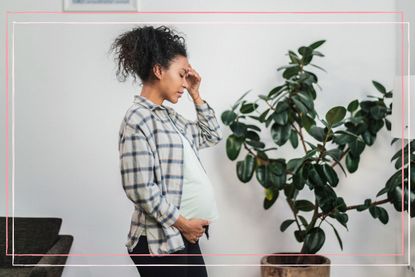
Two GPs explain the signs and symptoms of anaemia in pregnancy and share the importance of getting the condition screened, managed and treated.
BY LAST UPDATED
Anaemia during pregnancy is common but is also linked to some serious complications, so it’s important to know the signs and symptoms of anaemia in pregnancy so you can get tested for the condition, the right treatment, and help manage it as soon as possible.
Anaemia during pregnancy should never be left untreated as it can increase the risk of complications during pregnancy and birth. GPs Dr Semiya Aziz and Dr Vikram Murthy shared their advice with us on the subject of anaemia and pregnancy, including common signs and symptoms to look out for and why it’s important to get checked as soon as possible if you think you might have the condition. You can get anaemia at any time you are pregnant or not. If you have any symptoms of anaemia, please speak to your doctor.
“Anaemia is a broad condition where the number of red blood cells or the haemoglobin concentration within them is lower than normal,” explains Dr Vikram Murthy.
“Haemoglobin is a protein found in red blood cells. It picks up oxygen from the lungs and carries it around the body.” Dr Semiya Aziz explains that the result of this is, “a reduction of oxygen being transported to tissues within the body.”
Although there are multiple different causes of anaemia – ranging from iron deficiency, vitamin B12 deficiency and folate deficiency, to immune system problems and long-term chronic diseases – Dr Murthy explains that the most common in pregnancy is iron deficiency anaemia. “In pregnancy, iron deficiency is the main cause and this is due to the volume of blood in the body increasing. As a result, your requirement for iron increases as this is used to make more blood to supply oxygen to your baby. A lack of iron can cause iron deficiency anaemia.”
“Signs and symptoms of anaemia commonly seen in pregnancy include fatigue, weakness, pale skin, shortness of breath, dizziness, headaches, or a fast heart rate,” says Dr Aziz.
How is anaemia in pregnancy treated?
As with any pregnancy symptoms, you will need to see your doctor if you think you have anaemia. They will ask you about your lifestyle and medical history, as well as run a full blood count (FBC) test.
“A simple blood test can check the iron, B12 and folate levels,” Dr Murthy explains. Once the cause of your anaemia has been identified, your GP will recommend the best treatment for you. This might be in the form of supplements like iron tablets.
“Like any iron deficiency anaemia, treatment typically relies on the use of iron supplements, which can help to replenish depleted iron stores and improve red blood cell production,” says Dr Aziz.
Dr Murthy explains, “If there is an iron deficiency, a simple iron tablet to take one, two or three times a day depending on your iron levels is a safe and easy solution. Similar medication is also available for vitamin b12 and folate deficiency. A folic acid supplement should be taken as soon as possible from finding out you are pregnant as this can reduce neural tube defects.”
If diagnosed with anaemia whilst pregnant your doctor or healthcare provider will want to keep monitoring you throughout your pregnancy.
In addition to supplements or tablets, Dr Aziz also explained to us that good nutrition and a healthy diet are also really important when it comes to preventing or managing anaemia in pregnancy. “It is also important to encourage good dietary habits and advise on taking prenatal vitamins that contain iron with vitamin C which helps to aid absorption,” Dr Aziz said.
Foods to eat and avoid if you are anaemic while pregnant
“Good nutrition is the best way to prevent anaemia in pregnancy,” Dr Murthy states. “You are more likely to develop anaemia if you are vegetarian or vegan. Good sources of iron include pulses, dark green vegetables, wholemeal bread, dried fruit such as apricots and fortified breakfast cereals. Other good sources of iron include lean red meat, poultry, eggs and fish.”
Dark green leafy vegetables include products like watercress and curly kale, whilst dried fruit like prunes and raisins are also good in addition to Dr Murthy’s recommendation of apricots.
Dr Aziz expands, “A healthy balanced diet focusing on eating the rainbow whilst being pregnant should always be encouraged. Pregnant women should focus on consuming iron-rich foods such as lean meats, poultry, fish, beans, lentils, tofu, fortified cereals, spinach, and other leafy green vegetables. Adding in foods rich in vitamin C may be beneficial and enhance iron absorption. This can be done by incorporating fruits and vegetables such as citrus fruits, strawberries, tomatoes and bell peppers into meals.
As well as ensuring you are eating a healthy, balanced diet during pregnancy, there are also some foods and drinks to avoid – especially if you are anaemic. “It is also important to avoid foods and beverages that can inhibit iron absorption, such as coffee, tea, and calcium-rich foods, within a few hours of consuming iron-rich foods.”
The NHS also recommends that you should avoid, “foods with high levels of phytic acid, such as wholegrain cereals, which can stop your body absorbing iron from other foods and tablets.”
For the full article please click here
Tags: https://www.goodto.com/wellbeing/amaemia-reason-signs-could-be-anaemia-68289